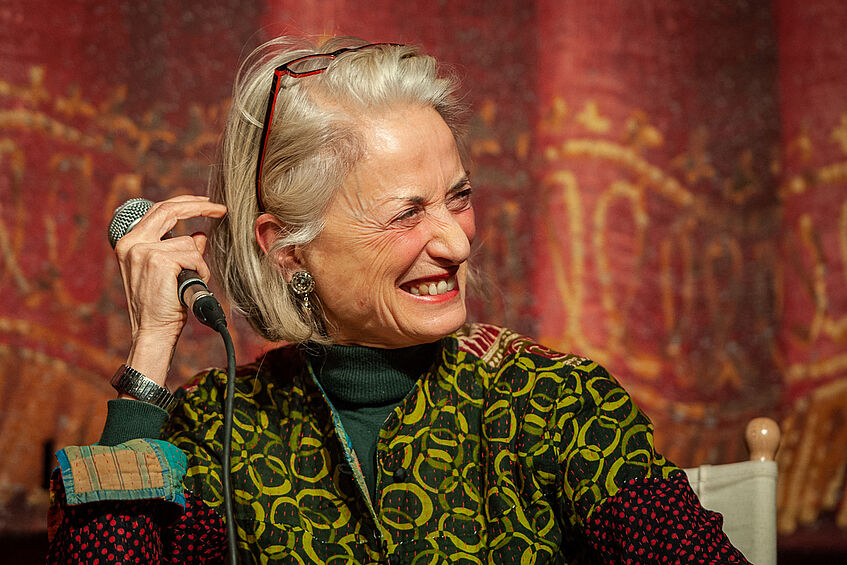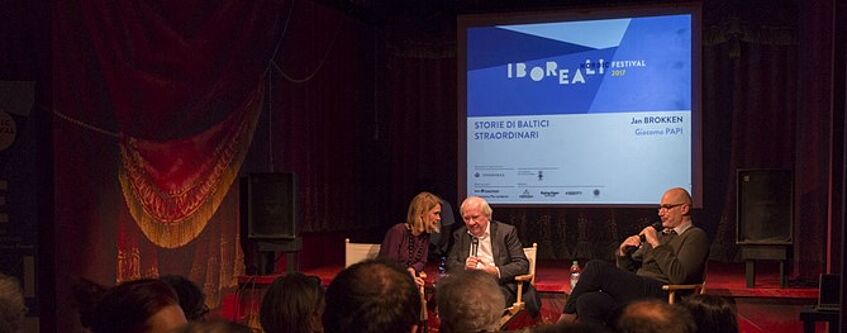Iperborea
It was the spring of 1987 when Emilia Lodigiani decided to establish Iperborea, a publishing house in her hometown Milan. The name is a clear reference to the mythical land of Hyperborea from Greek mythology, a place in the far northern part of the known world where its people were thought to live in an eternal golden age constantly blessed by the gods, and it represents the civil virtues of the Scandinavian people

Emilia Lodigiani
As a matter of fact, Iperborea started by publishing only Scandinavian authors. The idea of focusing only on Northern European literature stems from Lodigiani’s years in Paris, where she worked as a journalist, while she lived near the Nordic library of Sainte-Geneviève and she spent most of her free time reading French translations of works by Scandinavian authors like Karen Blixen, Lars Gustafsson and Henrik Stangerup. “But once I came back to Italy I noticed that none of them was translated into Italian. Hence the idea of founding Iperborea” explained the publisher in a 2007 interview with Italian newspaper La Repubblica.
Diversity of genres and countries
The list of books published by Iperborea ranges from the works of classic writers to the best authors of contemporary literature and from Nobel Prize winners such as Selma Lagerlöf (the first woman to win the prize) to writers of ancient Icelandic medieval sagas. Moreover, the house also publishes Mumin comic strips and I Miniborei, a book series dedicated to children’s literature. In 2018, it started The Passenger: a collection of literary reports and narrative essays that describe the contemporary life of a country and its inhabitants with maps, infographics and photo illustrations by some of the best international photographers. On September 2018, Iperborea published The Passenger – Olanda, a guide to The Netherlands which focused on many different topics such as politics, the colonial past of the kingdom with its controversial traditions and, of course, the relationship of Dutch people with water and its management. (#Literature and society)

It was only later that Lodigiani decided to open the doors to Icelandic, Estonian and, most importantly, Dutch-language literature. In 1991, Iperborea published Il canto dell’essere e dell’apparire (Een lied van schijn en wezen), its first book from Dutch Nobel prize candidate Cees Nooteboom whom the publisher was fascinated by. It was Nooteboom’s first work ever to be translated in Italy and its success paved the way to other Dutch-speaking authors like Hella Haasse, Willem Elsschot and, especially, Kader Abdolah whose books sold more than 100.000 copies and brought to Italy the considerations of the author fleeing the wars in the Middle East. Of course, Belgium and The Netherlands could not be referred to as Scandinavian countries but, in a 2018 interview, Lodigiani stated that Dutch-language literature has three main shared features with Nordic literature: “it looks beyond its borders, it enhances the relationship between man and nature, and questions the meaning of life”.

Iperborea does not only boast a list of well-known writers, but it also works with some of the most important Italian translators. When it started to translate Dutch-language books, the publisher only had three translators for this combination. Nowadays, however, works from Dutch-language countries are probably the most translated after the Swedish ones, and the publishing house can count on many professionals such as Elisabetta Svaluto Moreolo (who translated all of the books by Kader Abdolah), Claudia Cozzi, Claudia Di Palermo, Franco Paris and Fulvio Ferrari. (#Translators)
Promotion of Northern European culture
The publisher also wants to promote the culture of the Northern European countries and organizes some yearly events around Italy. From 2009 to 2013, Iperborea organized the Caffè: a festival focused on a specific country and its culture. The festival took the name of the capital city of the country so, for example, in 2009 was organized the first Caffè Amsterdam which was focused on Dutch literature and took place in Milan. The festival was an occasion for the publishing house to invite many authors from The Netherlands like Frank Westerman and Adriaan Van Dis to present their recent works as well as to promote Dutch culture through films and theatre performances. After the Caffè Stoccolma in 2013, the publishing house started I Boreali, the most important Italian festival for Nordic culture. During this 15-day-long festival, there are many events focused on Scandinavian and Northern European culture such as meetings with writers, directors, intellectuals, concerts and music events, a film festival, workshops for children, language courses and seminars. One of the festival's regular presences is definitively Jan Brokken, one of the most successful Dutch writers among Italian readers, who participated in the event from 2017 to 2020 to present his new works as well as to discuss about various interesting topics such as a meditation on the Baltic countries and their most important personalities.

Jan Brokken during an event for “I Boreali” festival in 2017
Iperborea is home for me
Nowadays, Iperborea is undoubtedly the benchmark for Northern European literature in Italy, for example, according to the Nederlands Letterenfond database, as of September 2021, 88 books have been translated from Dutch. The publisher has also a very solid and loyal relationship with its authors: For the house's 25th anniversary, Dutch-speaking Iranian author Kader Abdolah wrote “Iperborea is home for me. Such beautiful people! When I’m with them I feel like I’m in a family. And when I write a new book I also think about them”.
